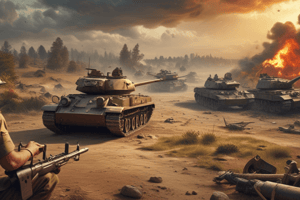Podcast
Questions and Answers
Who described the crimes committed by the Germans during World War II as unparalleled in scale and wickedness?
Who described the crimes committed by the Germans during World War II as unparalleled in scale and wickedness?
- Joseph Stalin
- Winston Churchill (correct)
- Franklin D. Roosevelt
- Adolf Hitler
What was a result of the Treaty of Versailles imposed on Germany?
What was a result of the Treaty of Versailles imposed on Germany?
- Financial aid for Germany's economic growth
- War guilt placed on other nations
- Severe restrictions on Germany's military (correct)
- Massive territorial gains for Germany
How did Adolf Hitler rise to power in Germany?
How did Adolf Hitler rise to power in Germany?
- By promoting economic stability
- By opposing fascist dictators
- Capitalizing on public discontent over the Treaty of Versailles (correct)
- By supporting the Treaty of Versailles
What event led to the end of World War I?
What event led to the end of World War I?
Which two countries engaged in the deliberate extermination of populations during World War II?
Which two countries engaged in the deliberate extermination of populations during World War II?
How did the economic instability caused by reparations impact Germany?
How did the economic instability caused by reparations impact Germany?
What were Hitler's aggressive expansionist goals focused on?
What were Hitler's aggressive expansionist goals focused on?
What marked the beginning of World War II?
What marked the beginning of World War II?
What was the objective of the Blitz, a sustained bombing campaign by Germany?
What was the objective of the Blitz, a sustained bombing campaign by Germany?
What was the outcome of the Battle of Britain in 1940?
What was the outcome of the Battle of Britain in 1940?
Why did Hitler shift his focus towards Operation Barbarossa?
Why did Hitler shift his focus towards Operation Barbarossa?
What happened to the German advance during Operation Barbarossa near Moscow?
What happened to the German advance during Operation Barbarossa near Moscow?
Flashcards are hidden until you start studying
Study Notes
- Winston Churchill described the crimes committed by the Germans during World War II as unparalleled in scale and wickedness, including the massacre of millions in execution camps.
- The deliberate extermination of entire populations was carried out by both Germany and Russia during the war.
- The use of atomic bombs on Hiroshima and Nagasaki was a culmination of the bombing of open cities from the air by the Germans, which was later repaid by the Allies.
- Skillshare is an online learning community offering thousands of classes in various subjects for personal and professional development.
- The origins of the Second World War can be traced back to the aftermath of World War I and the Treaty of Versailles, with mistakes made by various nations contributing to the rise of fascist dictators and the ensuing conflict.- On the 11th hour of the 11th day of the 11th month, an armistice ended World War I, leading to the Treaty of Versailles.
- The Treaty of Versailles imposed harsh penalties on Germany, including massive territorial losses and severe restrictions on its military.
- The Treaty of Versailles included a war guilt clause, blaming Germany for the war and demanding reparations that crippled the German economy.
- The economic instability caused by reparations contributed to hyperinflation and economic turmoil in Germany during the 1920s and 30s.
- Adolf Hitler rose to power in Germany by capitalizing on public discontent over the Treaty of Versailles and economic hardships.
- Hitler's aggressive expansionist goals included acquiring Lebensraum in Eastern Europe and combating what he termed "Judeo-Bolshevism."
- Hitler's rise to power culminated in his appointment as Chancellor of Germany in 1933, followed by his consolidation of power as Fuehrer in 1934.
- Hitler advocated for the return of Germany to its pre-World War I position and initiated rearmament in violation of the Treaty of Versailles.
- The policy of appeasement by Western powers, notably Britain and France, enabled Hitler's territorial conquests in Austria and Czechoslovakia.
- The invasion of Poland by Germany in September 1939 marked the beginning of World War II, leading to the declaration of war by Britain and France.
- The British evacuation at Dunkirk in 1940 saved over 330,000 Allied troops but left behind heavy equipment and artillery.
- The Battle of Britain in 1940 saw the Royal Air Force successfully defending against the Luftwaffe, preventing a German invasion of Britain.
- Hitler's focus shifted towards Operation Barbarossa, the invasion of the Soviet Union, leading to devastating consequences for both parties.
- The Blitz, a sustained bombing campaign by Germany against British cities, aimed to demoralize the population but failed to achieve surrender.
- Operation Barbarossa in 1941 was Hitler's ambitious attempt to conquer the Soviet Union, leveraging German military superiority against Soviet numbers.- Luftwaffe attacked Soviet airfields before the ground invasion by Hitler's Panzers, advancing over 50 miles in two days and capturing tens of thousands of Soviet prisoners.
- The German blitzkrieg was successful, reaching Smolensk near Moscow, where the tanks rested to allow the rest of the army to catch up, while Soviet prisoners were sent west to captivity.
- Hitler ordered Army Group North to move south to Kiev, despite objections from his generals, leading to disastrous consequences as the Soviet manpower seemed endless.
- In Leningrad, rather than capturing the city, the Germans decided to starve it, resulting in over 11,000 deaths in November and a devastating siege lasting over two years.
- The Battle of Stalingrad marked one of the longest battles of World War II, resulting in heavy casualties for both sides, with the Soviet winter offensive turning the tide against the German forces.
Studying That Suits You
Use AI to generate personalized quizzes and flashcards to suit your learning preferences.




